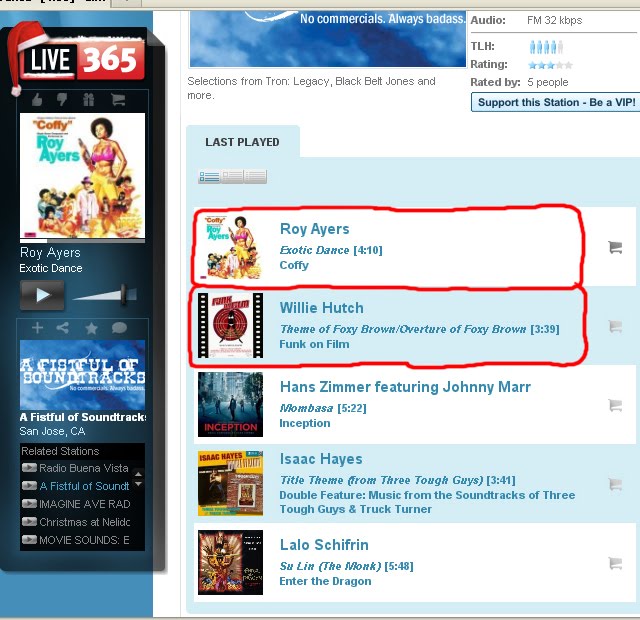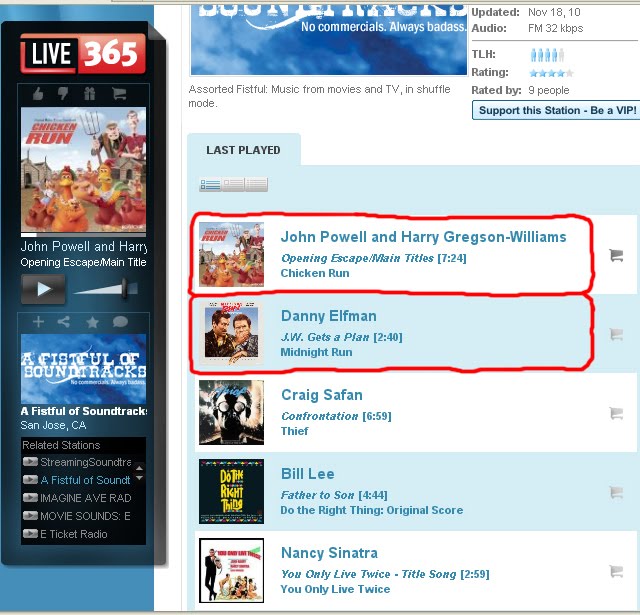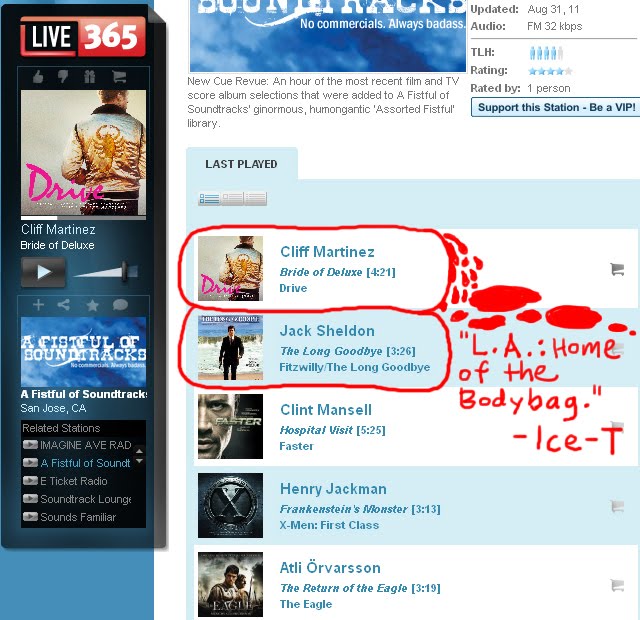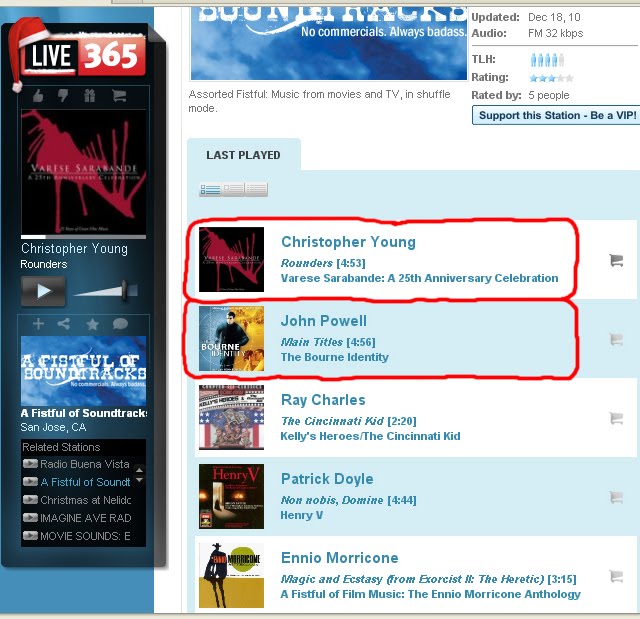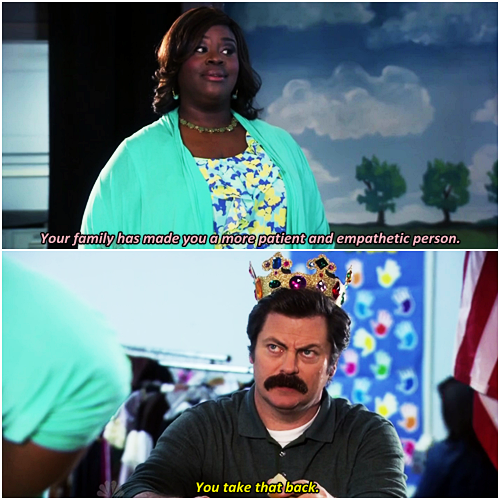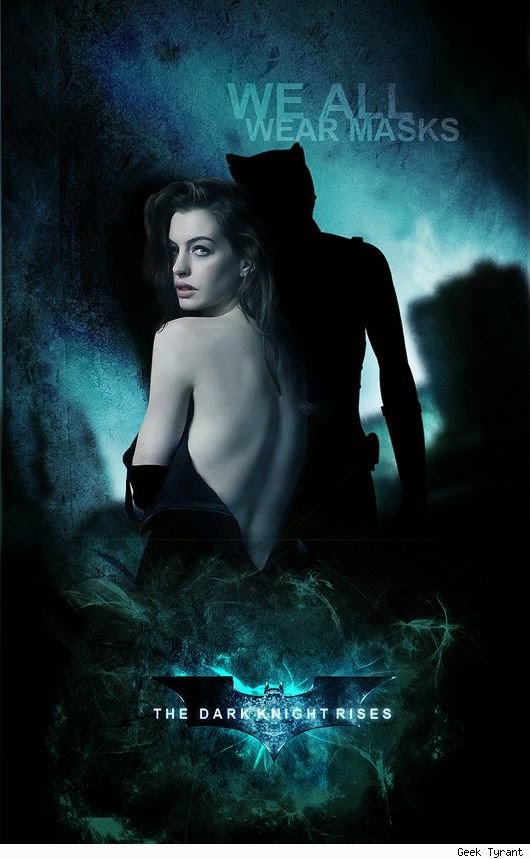Every Throwback Thursday, I randomly pull out from my desk cabinet--with my eyes closed--a movie ticket I saved. Then I discuss the movie on the ticket and maybe a little bit of its score, which might be now streaming on AFOS.
What I wrote about Ratatouille here on the AFOS blog back in 2007:
Ratatouille is a love story, but it's not your usual one. The main romance of the film is not the Linguini/Colette relationship--it's Remy the rat's love of cooking and fine dining. Giacchino's lush and playful score beautifully captures Remy's optimism and enthusiasm for the art of cooking without getting all overly gooey on us, which is why I'm adding to "Assorted Fistful" rotation four cues from the Walt Disney Records release of Giacchino's Ratatouille soundtrack.
Other things I dug about Ratatouille: the clever casting of Ian Holm, who played a similar "sellout" restaurateur character in the Deep Throat of food porn flicks, Big Night; Bird's jabs at the merchandising tactics of a certain parent company with a name that rhymes with "piznee" (during the scenes in which Holm's villainous Skinner plans to launch an inane line of frozen dinners exploiting the image of his deceased former boss, celebrity chef Gusteau); and the refreshing absence of corny and unsubtle pop culture reference gags that have been abundant in sub-Pixar animated flicks.
What I think about Ratatouille in 2015:
An unlikely box-office hit with one of the weirdest plots ever to be found in a summer blockbuster (an unusually intelligent rat's determination to become a gourmet chef), Ratatouille still holds up, and the 2008 Best Animated Feature Oscar winner will hold up forever. The DVD and Blu-ray releases of Ratatouille don't contain an audio commentary, but Baron Vaughn and Leonard Maltin's interesting Maltin on Movies discussion of why Ratatouille is such a sublime Brad Bird movie would suffice as a short commentrak for the movie ("If I see Brad Bird ever, I am going to kiss him on his mouth," jokes Vaughn), even though their 15-minute discussion, which takes place at the start of Maltin on Movies' recent "Food Movies" episode, isn't exactly scene-specific.
Bird's animated ode to culinary artistry isn't just an outstanding food movie. It's also a great Bay Area movie--even though it takes place in Paris. "The Bay Area is so obsessed with food that just finding the latest cheese, the tangiest sourdough or the richest coffee is enough to spark passionate debates," said the San Francisco Chronicle in its 2007 interview with celebrity chef Thomas Keller, Ratatouille's primary food consultant, and producer Brad Lewis about their movie. Like all other Disney/Pixar movies, Ratatouille was animated in the Bay Area, but it's the most Bay Area-esque out of all of them, because of how much Northern California's epicurean approach to food and wine suffuses Ratatouille. Pixar's location deep in the heart of the Bay Area culinary scene made the animators' culinary research really easy to access, and man, that research, which entailed cooking classes and visits to kitchens in both the Bay Area and Paris, really pays off in the movie.
Ratatouille is the quintessential family film for people like me who hate most family films. It's so enjoyably un-Disney-like--and adult--for a Disney film. Nobody bursts into a grating musical number; the film bites the hand that feeds it through its criticisms of Disney-style mass-merchandising; there's lots of dialogue about wine (in fact, Disney wanted to introduce a line of Ratatouille wines and sell it at Costco, but the studio nixed it after the California Wine Institute argued that it would encourage underage drinking); and one of the film's heroes was born out of wedlock, usually a no-no in animated Disney fare.
It builds up Anton Ego, the late Peter O'Toole's intimidating restaurant critic character, as this typical Disney villain (note how his office is shaped like a coffin, and the back of his typewriter resembles a skull face), but then it takes O'Toole's antagonist in an unexpected, completely different and believable direction. And it moves you not by killing off some child character's parent (although both of Linguini's parents are long-dead) or through some other form of misery porn. It moves you through an understated climactic voiceover, eloquently and magnificently delivered by O'Toole and nicely scored by Michael Giacchino, about the power of art and the need for critics--whether in the haute cuisine community, the film community or any other artistic community--to not be set in old ways.
O'Toole steals Ratatouille from Patton Oswalt--whose brilliant stand-up routine about overly aggressive Black Angus steakhouse ads interestingly landed him the role of Remy--whenever Ego's on screen. I especially love how O'Toole pronounces "popular" as if it's a dirty word. I wish Ego had more screen time. But then again, that's part of what makes O'Toole's performance such a highlight of Ratatouille. To borrow Ego's own words, his performance leaves you hungry for more.
Selections from Giacchino's Ratatouille score can be heard during the AFOS blocks "AFOS Prime" and "Brokedown Merry-Go-Round."
What I wrote about Ratatouille here on the AFOS blog back in 2007:
Ratatouille is a love story, but it's not your usual one. The main romance of the film is not the Linguini/Colette relationship--it's Remy the rat's love of cooking and fine dining. Giacchino's lush and playful score beautifully captures Remy's optimism and enthusiasm for the art of cooking without getting all overly gooey on us, which is why I'm adding to "Assorted Fistful" rotation four cues from the Walt Disney Records release of Giacchino's Ratatouille soundtrack.
Other things I dug about Ratatouille: the clever casting of Ian Holm, who played a similar "sellout" restaurateur character in the Deep Throat of food porn flicks, Big Night; Bird's jabs at the merchandising tactics of a certain parent company with a name that rhymes with "piznee" (during the scenes in which Holm's villainous Skinner plans to launch an inane line of frozen dinners exploiting the image of his deceased former boss, celebrity chef Gusteau); and the refreshing absence of corny and unsubtle pop culture reference gags that have been abundant in sub-Pixar animated flicks.
What I think about Ratatouille in 2015:
An unlikely box-office hit with one of the weirdest plots ever to be found in a summer blockbuster (an unusually intelligent rat's determination to become a gourmet chef), Ratatouille still holds up, and the 2008 Best Animated Feature Oscar winner will hold up forever. The DVD and Blu-ray releases of Ratatouille don't contain an audio commentary, but Baron Vaughn and Leonard Maltin's interesting Maltin on Movies discussion of why Ratatouille is such a sublime Brad Bird movie would suffice as a short commentrak for the movie ("If I see Brad Bird ever, I am going to kiss him on his mouth," jokes Vaughn), even though their 15-minute discussion, which takes place at the start of Maltin on Movies' recent "Food Movies" episode, isn't exactly scene-specific.
Bird's animated ode to culinary artistry isn't just an outstanding food movie. It's also a great Bay Area movie--even though it takes place in Paris. "The Bay Area is so obsessed with food that just finding the latest cheese, the tangiest sourdough or the richest coffee is enough to spark passionate debates," said the San Francisco Chronicle in its 2007 interview with celebrity chef Thomas Keller, Ratatouille's primary food consultant, and producer Brad Lewis about their movie. Like all other Disney/Pixar movies, Ratatouille was animated in the Bay Area, but it's the most Bay Area-esque out of all of them, because of how much Northern California's epicurean approach to food and wine suffuses Ratatouille. Pixar's location deep in the heart of the Bay Area culinary scene made the animators' culinary research really easy to access, and man, that research, which entailed cooking classes and visits to kitchens in both the Bay Area and Paris, really pays off in the movie.
Ratatouille is the quintessential family film for people like me who hate most family films. It's so enjoyably un-Disney-like--and adult--for a Disney film. Nobody bursts into a grating musical number; the film bites the hand that feeds it through its criticisms of Disney-style mass-merchandising; there's lots of dialogue about wine (in fact, Disney wanted to introduce a line of Ratatouille wines and sell it at Costco, but the studio nixed it after the California Wine Institute argued that it would encourage underage drinking); and one of the film's heroes was born out of wedlock, usually a no-no in animated Disney fare.
It builds up Anton Ego, the late Peter O'Toole's intimidating restaurant critic character, as this typical Disney villain (note how his office is shaped like a coffin, and the back of his typewriter resembles a skull face), but then it takes O'Toole's antagonist in an unexpected, completely different and believable direction. And it moves you not by killing off some child character's parent (although both of Linguini's parents are long-dead) or through some other form of misery porn. It moves you through an understated climactic voiceover, eloquently and magnificently delivered by O'Toole and nicely scored by Michael Giacchino, about the power of art and the need for critics--whether in the haute cuisine community, the film community or any other artistic community--to not be set in old ways.
O'Toole steals Ratatouille from Patton Oswalt--whose brilliant stand-up routine about overly aggressive Black Angus steakhouse ads interestingly landed him the role of Remy--whenever Ego's on screen. I especially love how O'Toole pronounces "popular" as if it's a dirty word. I wish Ego had more screen time. But then again, that's part of what makes O'Toole's performance such a highlight of Ratatouille. To borrow Ego's own words, his performance leaves you hungry for more.
Selections from Giacchino's Ratatouille score can be heard during the AFOS blocks "AFOS Prime" and "Brokedown Merry-Go-Round."













